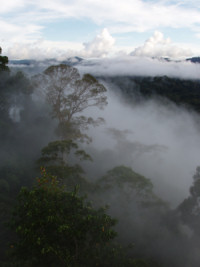Oxidant and particle photochemical processes above a
South-East Asian tropical rain forest (OP3)
Introduction
Tropical forests account for over half of the World's forests (1.8 billion ha) and act as a massive source of matter and energy to the lower atmosphere. Globally, equatorial and other tropical forests are estimated to account for almost half of all biogenic reactive volatile organic compound (VOC) emissions into the atmosphere (Guenther et al., 1995; global total 1150 Tg C/y, estimate for tropical forests ~500 Tg C/y). They are believed to play a major role in mediating the chemistry of the atmosphere, yet their roles in controlling chemical budgets and processes in the atmosphere on the local, regional and global scales are actually poorly understood.
The OP3 Project
The OP3-DANUM-08 project will combine ground-based and airborne field measurements of surface fluxes and atmospheric composition of reactive trace gases and particles with modelling studies of chemical processes in a protected forest area of Sabah, East Malaysia, to better understand how a south-east Asian rain forest contributes to the formation of ozone and particles in the lower atmosphere.
The objectives of the OP3 project are:
- (i) To understand how emissions of reactive trace gases
from a tropical rain forest mediate the production and processing of oxidants and particles in the
troposphere.
- (ii) To better understand the impact of these processes on local, regional and
global scale atmospheric composition, chemistry and climate.
In meeting these objectives, the project will seek to address the following key questions:
- What are the rates of transfer and the speciation of organic compounds emitted from this tropical forest region?
- How are these biogenic reactive compounds chemically processed in the near and intermediate field?
- How do these emissions contribute to the formation of longer-lived intermediate products?
- To what extent does the regional biogenic emission control the secondary aerosol budget and its hygroscopic and radiative properties?
- What are the effects of these biogenic emissions on global chemistry and climate?
The scientific and social imperatives driving this project are the recognition that the tropical biosphere is one of the main sources of reactive trace gas emissions into the global atmosphere, the undoubted chemical changes that are occurring in the atmosphere, and the very rapid changes to land-use that are inexorably altering the nature of the tropical biosphere. In addition, given that the emission rates of many trace gas species derived from the biosphere are temperature dependent, the impact the biosphere has on atmospheric chemistry may change in the future as the global climate warms.
The OP3 project is a consortium of 23 principle investigators from 8 UK institutions and project partners from Malaysia and the USA. The consortium is led by Professor Nick Hewitt of Lancaster University. OP3 field measurements took place in Danum Valley Conservation Area, Sabah, Malaysia (on the island of Borneo) during April/May, and June/July 2008. The measurement phase of OP3 was also integrated with the field measurement phase of the ACES project, which also undertook measurements in Malaysia during this time period.
Further information about the OP3-DANUM-08 project can be found on the consortium web site:
